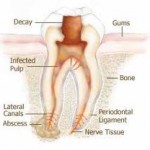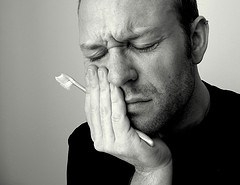Continued from Part 1
Teeth grinding habit
Clenching and grinding or bruxing of the teeth can cause additional occlusal load or stress to the teeth and may lead to fracture of a restored tooth, causing pain. Continue reading
Continued from Part 1
Clenching and grinding or bruxing of the teeth can cause additional occlusal load or stress to the teeth and may lead to fracture of a restored tooth, causing pain. Continue reading
Teeth fillings are placed to restore a tooth back to its functional or aesthetic state. Besides tooth decay, tooth filling is also done for cracked and broken tooth, worn teeth, bruxism (teeth grinding) and other reasons. However the problem of tooth pain after filling is done can be quite common. Continue reading
Sometimes you feel a sharp tooth pain upon biting and it causes you much annoyance and agony. There are many reasons for pain on biting and a cracked tooth is one of them. Continue reading
Continued from Part 3
Most persons who have had head injuries have local pain or tenderness at the site of impact for a few hours or even for a few days, after which many become symptom-free. However up to one half of all persons who injure their heads sufficiently to warrant hospitalization develop chronic post-traumatic headaches. Continue reading
Continued from Part 2
Pain from the temporomandibular joint may result from dysfunction, trauma, acute or chronic inflammation, or primary or secondary cancerous tumors. Examination may reveal the masticatory (chewing) muscles tender to palpation or occasionally the joint swollen and warm to touch or tender to palpation via the external auditory meatus. Pain from the temporomandibular joint: Continue reading
Continued from Part 1
Pain associated with acute perapical periodontitis:
Is spontaneous in onset
Is moderate to severe in intensity
Persists for long periods of time (hours)
Is worsen by biting on tooth and in more advanced cases, even by closing the mouth and bringing the affected tooth gently into contact with the opposing teeth. In these cases, the tooth feels ‘high’ (extruded) and is sensitive to touch Continue reading
Everyone has experienced pain at least once in their lifetime. Pain is an unpleasant sensory and emotional experience associated with actual or potential damage or described in terms of such damage. Pain is not only a sensory experience, its relation with tissue damage may not be constant and it is often associated with affective and cognitive responses. Continue reading
A toothache pain can be one of the worse pains you ever experience. The pain is annoying to the extent that you cannot carry on your normal daily activities but it is your tooth’s way of telling you that something is very wrong and needs attention.
Toothaches may be caused by a variety of problems such as dental cavities, gum diseases, exposed tooth root, a cracked tooth, and others. The most common cause of toothache is tooth decay caused by bacteria in the mouth. Tooth decay does not happen all at once as it take months for bacteria plaque on the surface of teeth to dissolve its way through the tooth enamel before it reaches the areas where pain is triggered – dentine and pulp. The more refined carbohydrates and sugar intake in your diet, the higher the risk of your teeth getting decayed as bacteria thrives on sugar. Continue reading
 Root canal treatment is the removal of inflamed and/or infected dental pulp tissue from the root canal system, shaping and filling the root canals of a diseased tooth. The key factor in the development of pulpal inflammation and breakdown of the supporting tissues of the tooth (periradicular tissues) is the presence of bacteria. These endodontal infections (infections within teeth) are usually characterized by loss of integrity of the crown, invasion by bacteria, and destruction of enamel, dentine, and eventual pulpal involvement. Dental caries, trauma, tooth surface loss, and microleakage around tooth fillings can lead to endodontal infection. In situations where there has been periradicular breakdown, root canal treatment will result in the return of the health of the periradicular tissues. Ultimately, root canal treatment preserves teeth as functional units within the dental arch. Continue reading
Root canal treatment is the removal of inflamed and/or infected dental pulp tissue from the root canal system, shaping and filling the root canals of a diseased tooth. The key factor in the development of pulpal inflammation and breakdown of the supporting tissues of the tooth (periradicular tissues) is the presence of bacteria. These endodontal infections (infections within teeth) are usually characterized by loss of integrity of the crown, invasion by bacteria, and destruction of enamel, dentine, and eventual pulpal involvement. Dental caries, trauma, tooth surface loss, and microleakage around tooth fillings can lead to endodontal infection. In situations where there has been periradicular breakdown, root canal treatment will result in the return of the health of the periradicular tissues. Ultimately, root canal treatment preserves teeth as functional units within the dental arch. Continue reading

Tooth sensitivity
Tooth sensitivity is a common dental condition where the teeth becomes extremely sensitive to hot and cold, leading to tooth pain. It affects quite a number of adults, sometimes affecting their lifestyle where certain food with extreme temperatures such as ice-cream or hot coffee needs to be taken cautiously or in some cases, avoided completely.
Tooth sensitivity occurs due to the exposure of dentinal tubules layer of the teeth which is usually protected by enamel. There are a range of factors that can contribute to dentine exposure, such as tooth grinding, broken tooth, tooth erosion, defective tooth filling, tooth whitening, tooth straightening, dental crown or bridge work and so forth. These are explained as followed: Continue reading